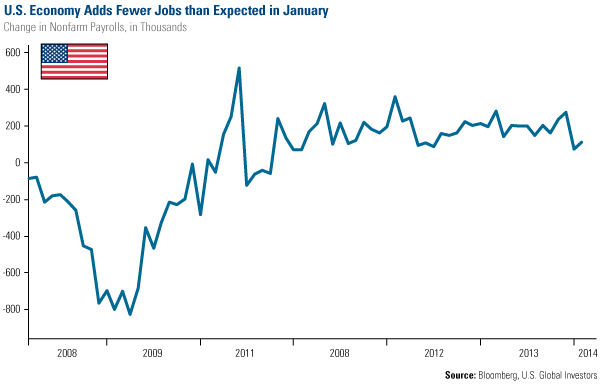The Economy and Bond Market Radar (February 10, 2014)
Treasury bond yields were mixed this week. We saw the long end of the yield curve rising, but saw a modest decline in yields in the short end of the curve. Economic data was also mixed this week with the two, most-widely watched numbers disappointing. The ISM Manufacturing Index fell in January to 51.3 from 57, which is a dramatic decline. Bad weather was cited, and although it may be reversed in upcoming months, the index should still be watched closely. The other big data point of the week was the weak nonfarm payroll report, which indicated only 113,000 jobs were created in January. Once again, weather likely played a factor, but the data was still disappointing.
Strengths
- The J.P. Morgan/Markit Global Manufacturing & Services PMI rose 0.1 in January, making this the sixteenth straight monthly increase.
- Retail sales for January rose 3.3 percent, beating expectations despite poor weather in many parts of the country.
- Mortgage applications rose 0.4 percent last week as mortgage rates fell five basis points to 4.47 percent.
Weaknesses
- Disappointing payroll growth for the past two months is pointing to a continued slow economic recovery.
- The ISM Manufacturing Index fell dramatically in January. Weather likely had an impact, but after similar disappointing numbers out of China, the report should not be dismissed.
- Auto sales declined in January and were generally worse than expected.
Opportunities
- Janet Yellen was officially sworn in as head of the Federal Reserve. She brings credibility and consistency to the position, making the transition relatively seamless.
- Key global central bankers remain in easing mode such as the European Central Bank (ECB), Bank of England and the Bank of Japan. ECB president Mario Draghi vowed to take “decisive action” if needed to combat deflation. Speculation is building that the ECB may take action in March.
- There are many moving parts to the taper decision, and while the Fed began the process, it is very possible that tapering could be delayed if the economy stumbles.
Threats
- Several emerging market countries are raising interest rates at an aggressive pace to either deal with inflation or a weak currency. It could be the beginning of a new global interest rate cycle for higher rates.
- Trade and/or currency “wars” cannot be ruled out which may cause unintended consequences and volatility in the financial markets.
- Puerto Rico was downgraded to “junk” status this week, highlighting the fact that even six years past the financial crisis, the fallout continues.














